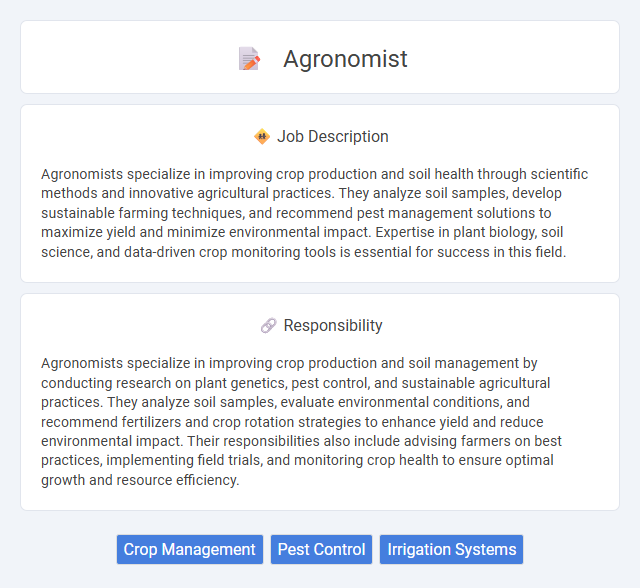
Agronomists specialize in improving crop production and soil health through scientific methods and innovative agricultural practices. They analyze soil samples, develop sustainable farming techniques, and recommend pest management solutions to maximize yield and minimize environmental impact. Expertise in plant biology, soil science, and data-driven crop monitoring tools is essential for success in this field.
Individuals with strong analytical skills and a passion for agriculture are likely to find the agronomist job suitable. Those comfortable working outdoors and handling scientific data may probably thrive in this role. However, people who prefer strictly indoor or non-scientific work might find the demands of this profession less compatible with their strengths.
Qualification
An agronomist typically requires a bachelor's degree in agronomy, agricultural science, or related fields such as soil science or crop production, with many positions preferring a master's degree for advanced research roles. Proficiency in plant biology, soil chemistry, and agricultural technology is essential, alongside skills in data analysis and field research methodologies. Certification such as Certified Crop Adviser (CCA) can enhance job prospects and demonstrate expertise to employers in the agricultural industry.
Responsibility
Agronomists specialize in improving crop production and soil management by conducting research on plant genetics, pest control, and sustainable agricultural practices. They analyze soil samples, evaluate environmental conditions, and recommend fertilizers and crop rotation strategies to enhance yield and reduce environmental impact. Their responsibilities also include advising farmers on best practices, implementing field trials, and monitoring crop health to ensure optimal growth and resource efficiency.
Benefit
Agronomists likely improve crop yields and soil health, benefiting farmers through enhanced productivity and sustainability. Their expertise probably reduces the necessity for chemical inputs, potentially lowering costs and environmental impact. Effective agronomic practices could increase food security and promote long-term agricultural resilience.
Challenge
Agronomists likely face challenges related to adapting crop production techniques to changing climate conditions and evolving pest resistance. Managing soil health and ensuring sustainable farming practices may require constant innovation and problem-solving. There is a probability that balancing economic viability with environmental stewardship will remain a persistent difficulty in the role.
Career Advancement
Agronomists advance their careers by gaining expertise in crop science, soil management, and sustainable agriculture practices. Pursuing advanced degrees such as a master's or PhD, along with certifications in agricultural technology and environmental regulations, enhances job prospects and leadership opportunities. Experience in research, project management, and collaboration with farmers and agribusinesses accelerates progression to senior roles like research director or agricultural consultant.
Key Terms
Crop Management
Agronomists specializing in crop management utilize advanced techniques in soil fertility, pest control, and irrigation to maximize agricultural productivity and sustainability. They analyze crop growth patterns and implement precision agriculture methods to optimize yield quality and resource use efficiency. Their expertise in plant pathology and crop genetics supports the development of resilient crop varieties adapted to diverse environmental conditions.
Pest Control
Agronomists specializing in pest control develop integrated pest management (IPM) strategies to protect crops while minimizing environmental impact. They analyze pest behavior, identify resistant crop varieties, and recommend targeted use of biological, chemical, and cultural control methods. Expertise in entomology, plant pathology, and pesticide regulations is essential for effective pest suppression and sustainable agriculture.
Irrigation Systems
Agronomists specializing in irrigation systems analyze soil moisture levels, crop water requirements, and climate data to design efficient irrigation plans that maximize crop yield and conserve water resources. They implement advanced technologies such as drip irrigation, sprinkler systems, and automated sensors to optimize water distribution and reduce waste. Expertise in sustainable practices and water management regulations ensures their strategies promote long-term agricultural productivity and environmental protection.
 kuljobs.com
kuljobs.com